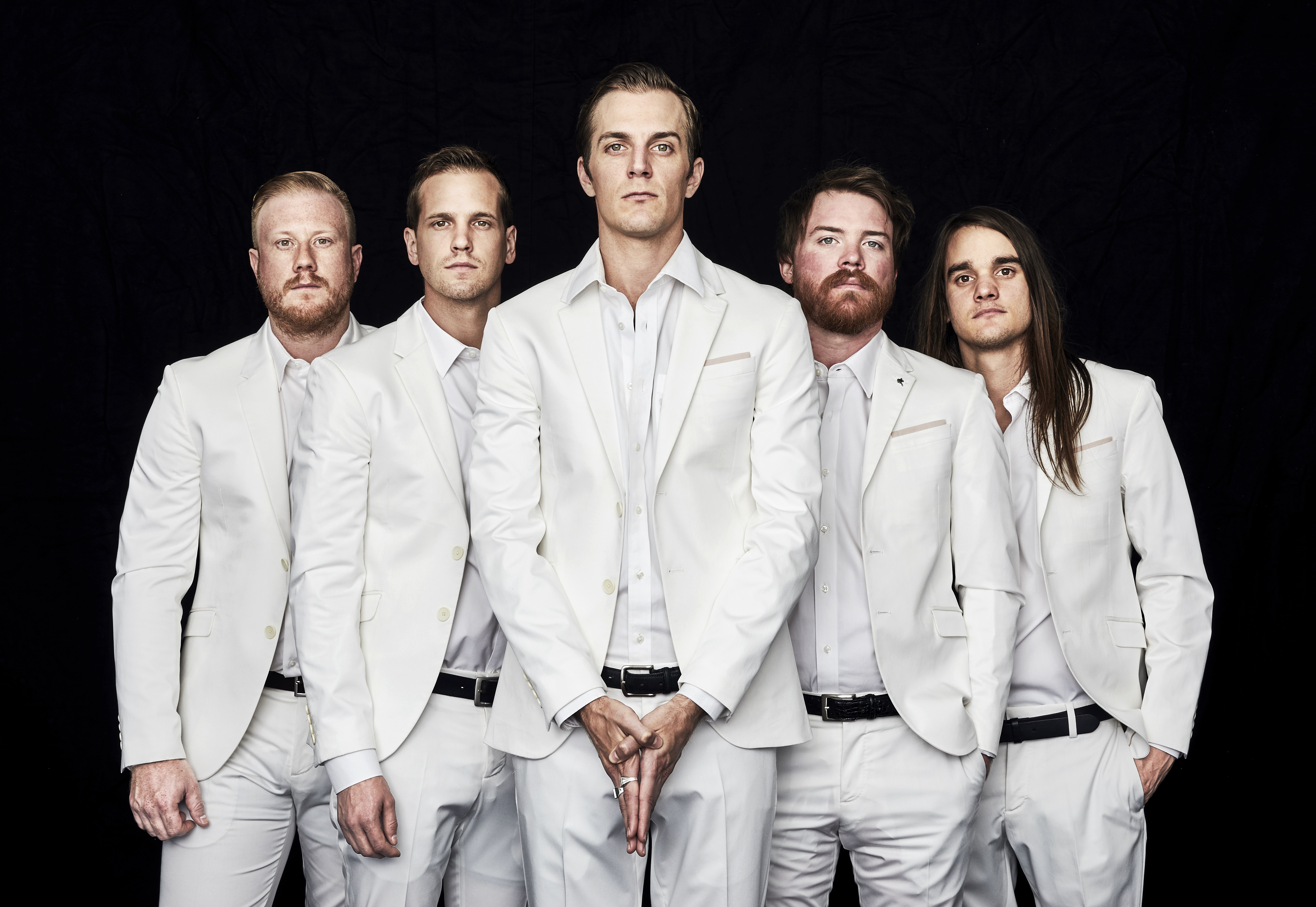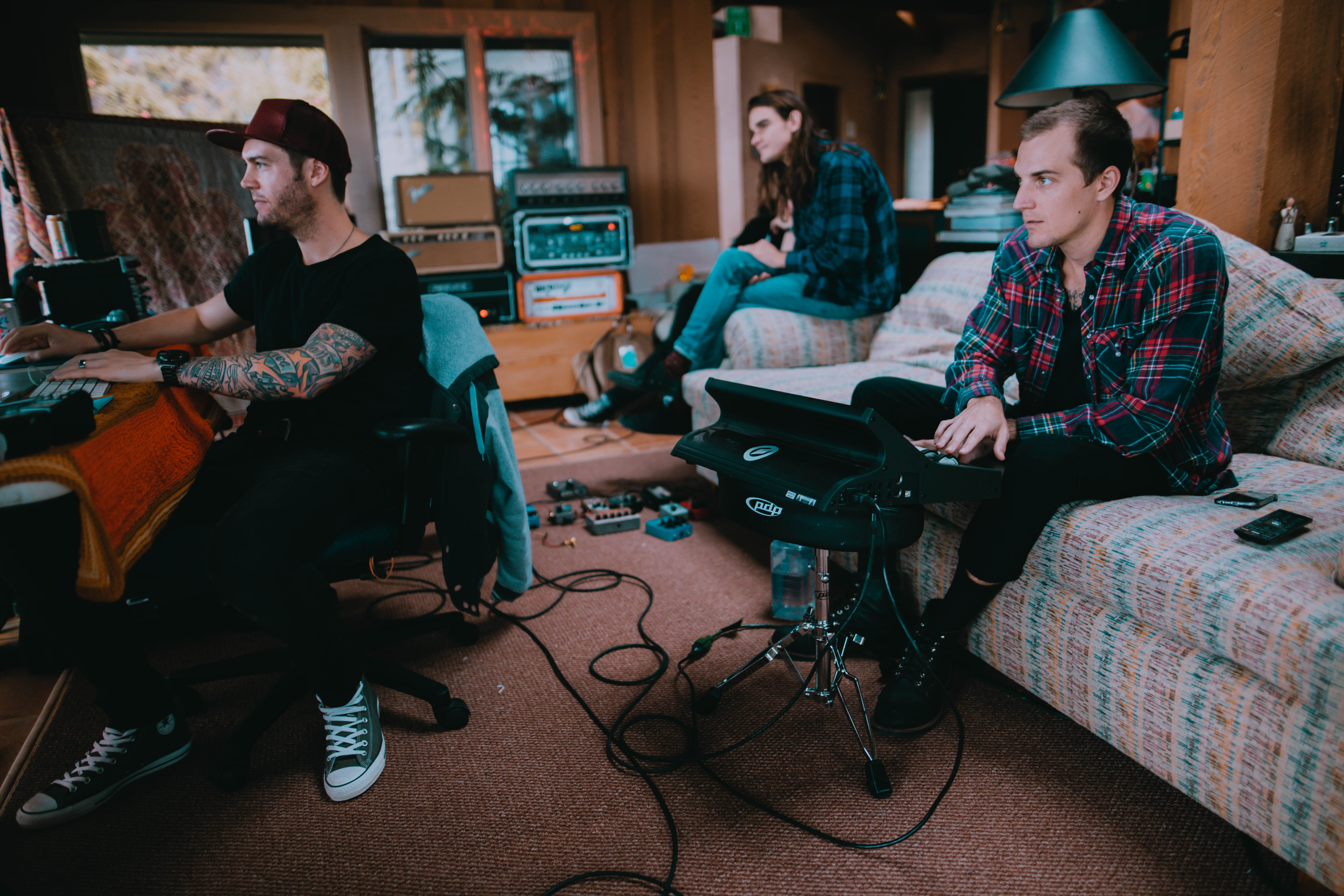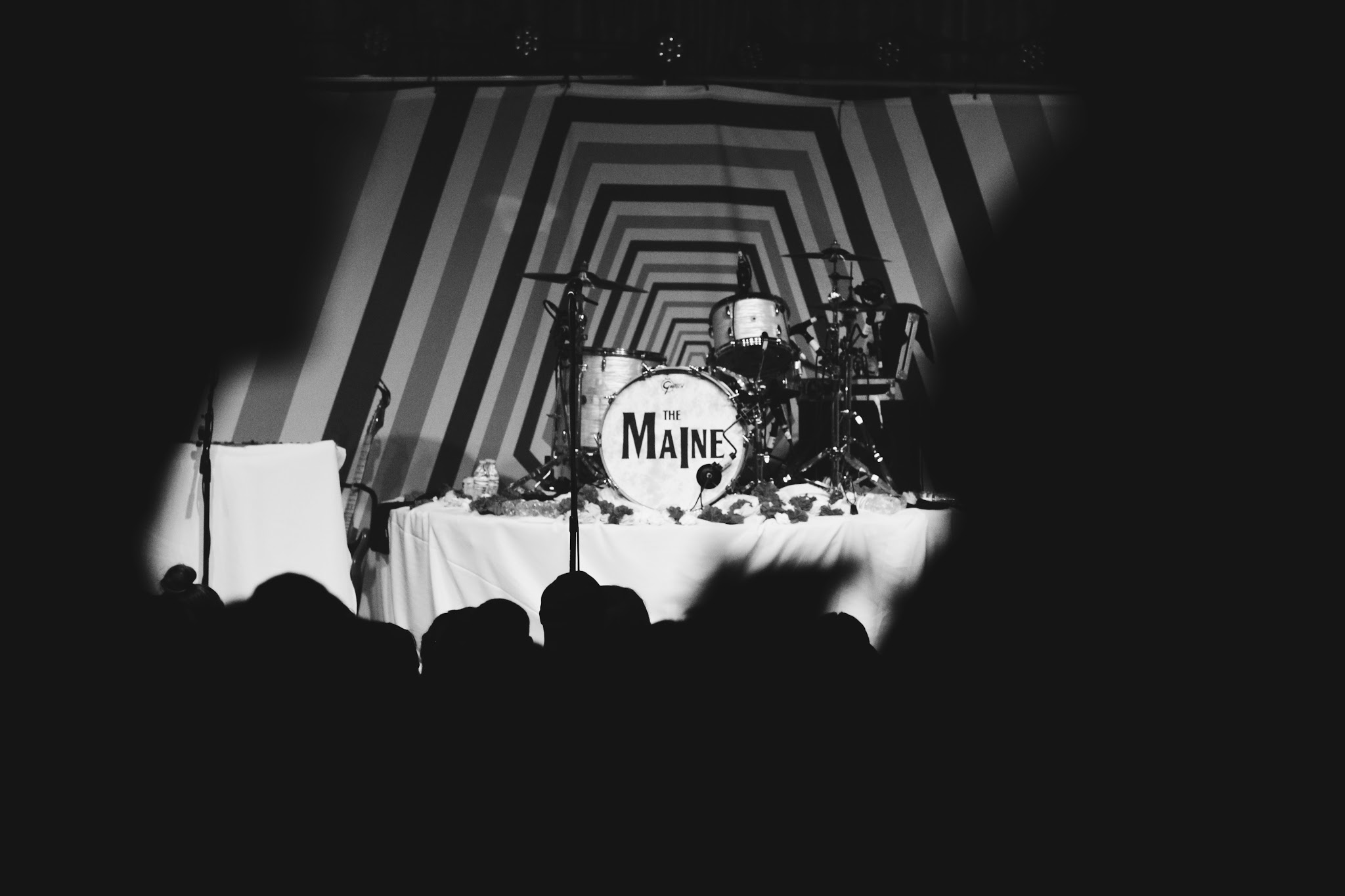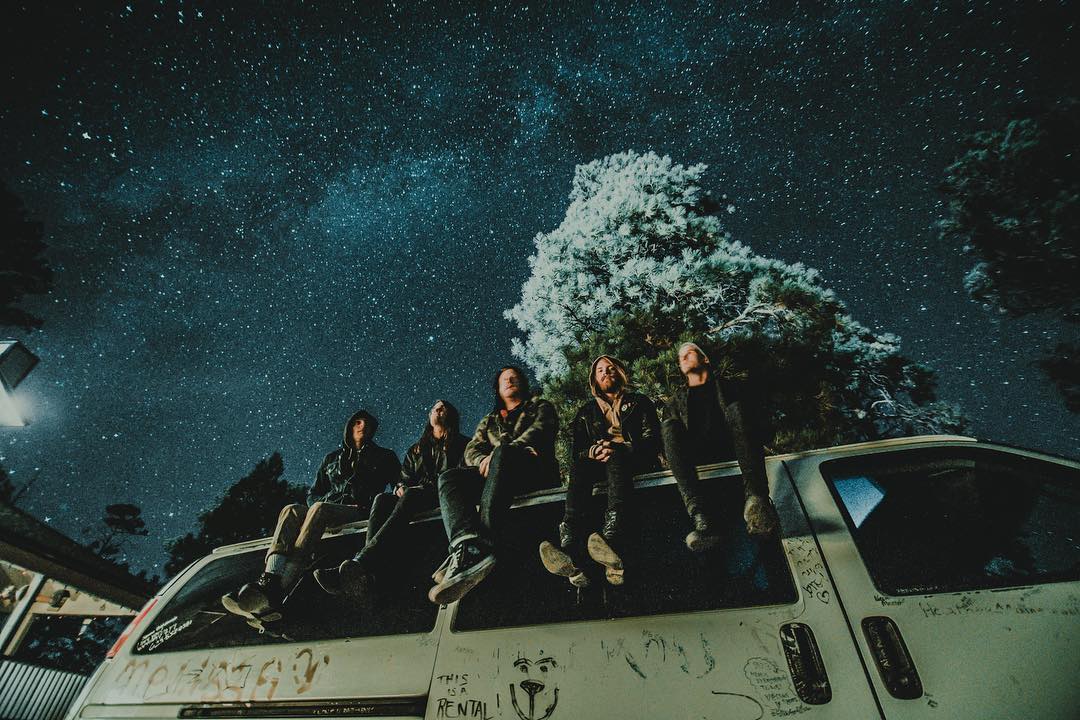
Here’s to now, and nothing else
Where one door closes, another opens. In this case, the metaphorical door closed on producer Colby Wedgeworth’s singing career, just as The Maine enthusiastically burst through another in their quest to self-release music and make a name for themselves. Good timing and a mutual appreciation for pop music brought Wedgeworth and The Maine together and, if the thousands of fans currently flocking to the Modern Nostalgia tour is any indication, this partnership opened up more opportunities than either party ever dreamed of.
It’s a Monday in mid-October when a familiar voice picks up the phone and introduces himself as “John O’Callaghan from The Maine”. He’s only one half of the interview though, Wedgeworth is set to join us any minute. While we wait, O’Callaghan and I discuss Columbus Day (“Pretty sure Columbus was a bad guy, I’m not 100% sure why everyone celebrates him.”) and I explain that it’s Thanksgiving in Canada. He’s intrigued by this (“They’re making you work on your holiday?”) and, once we realize that Wedgeworth has quietly slipped into the conversation, O’Callaghan greets him with a hearty “Happy Canadian Thanksgiving!” Not missing a beat, Wedgeworth replies with “Oh wow, it snuck up on me this year”.
I don’t think to ask them where they are—I assume O’Callaghan’s at home in Arizona, while Wedgeworth is most likely in Nashville—but they have such an easygoing camaraderie that it feels like we’re all in the same room. Later, O’Callaghan tells me that Wedgeworth (who he affectionately refers to as “Colb” a couple of times during our chat) is considered an honorary sixth member of the band. They’ve come a long way from their first collaboration in 2011, back when The Maine was just breaking free from their record label and setting off on their own. Since then, they’ve released multiple successful albums, toured the world, and celebrated their tenth anniversary earlier this year. And in all that time there’s been one constant, outside of their dedicated fanbase: The band’s relationship with Wedgeworth, a guy who seems to understand the The Maine on a higher level.
Take the leap if it’s worth the fall
The Maine—and Wedgeworth’s—most recent project is this year’s Lovely Little Lonely, released in April after they unexpectedly announced it in January to their fans’ delight. It’s one of their most cohesive works to date, twelve pop-rock jams, including the three abstract interludes that give the album its name and seamlessly connect each song. It’s one of two albums The Maine is playing in full on their current Modern Nostalgia tour; the other album is 2015’s American Candy, also produced by Wedgeworth. When I mention that American Candy and Lovely Little Lonely are two of my favorite albums, Wedgeworth and O’Callaghan are both pleased to hear it, joking that they appreciate the support from someone “not on their payroll”.
“I still feel like American Candy is our first album as a band,” O’Callaghan says. “The previous album (2013’s Forever Halloween) was the first opportunity we had to record live and that did something for our confidence and our dynamic. It solidified for me that we were an actual band,” he adds with a laugh, “which sounds weird because we’d made other albums before!”
“Going into American Candy, I didn’t have a clear vision of what kind of album I wanted to make. I was tired of hearing questions about my emotional state,” O’Callaghan continues, noting that American Candy is a “happier sounding record” than the more dramatic Forever Halloween. Despite the many years and albums under The Maine’s collective belts, he feels that Lovely Little Lonely, was the first time they truly created a full record from start to finish. “American Candy, on our end, was a bit more of a compilation of songs with a similar feeling which had a lot to do with Colby and how he harnessed the sound and helped direct the whole process.”
“We’re just so God-dang excited to be a part of what we’re doing in this moment.”
When it came time to go into the studio for Lovely Little Lonely, the band built on the types of feelings and sounds they first started exploring with American Candy. “I also wanted to create a sonic narrative on Lovely Little Lonely,” says O’Callaghan, joking that he’s rambling as he tries to gather his thoughts.

Wedgeworth chimes in, “We took ideas and sounds out of American Candy and said ‘Okay, we know we like this, let’s use some of this in the next album’. For me, because of the way we recorded both of them, going out to secluded towns and [focusing] on the records, it makes them feel similar.”
With this thought, another opportunity came knocking. The Maine considered: If the two albums felt similar, why not tour and play them together? The band, feeling that American Candy and Lovely Little Lonely were always “made to be listened to from front to back”, set out to give fans a new way to experience and appreciate the two Wedgeworth-produced albums that provide the cornerstones of The Maine’s journey thus far. And so, Modern Nostalgia was born—a way for them to both look back at what they’ve done, while still celebrating what’s to come.
“I feel like the reason we wanted to do this tour was because of how excited we are about what we’re doing right now,” says O’Callaghan. “It’s not necessarily a knock on reunion tours or the tenth anniversary tours that everyone seems to be cashing in on,” he adds hastily, “I feel like there is a portion of ourselves that, at some point, will want to acknowledge the past [with an anniversary tour]. But we’re just so God-dang excited to be a part of what we’re doing in this moment. We were honestly floored by the responses we received from the past two albums.”
The past is in the rear view
and the future holds no weight
If you’re a The Maine-fan, you know there’s no shortage of content from the band. They always find ways to connect with you, whether it’s through a web series or their infamous free meet and greets, and they’re one of the few bands who regularly release music—full-lengths, acoustic EPs, even a handful of covers—without long dry spells in between. But it was still a surprise when they kicked off January’s 8123 Fest with a new song. “Bad Behavior” dropped the day before the weekend-long anniversary event started due to the “good grace of the universe and just lucky timing,” according to O’Callaghan.
“As we were creeping closer to the date, it just made more and more sense. That specific event was such a culmination of the past ten years and we knew we’d have a window that weekend of garnering the attention of a lot of people who were either missing out on the fest or having all the people there being fully attentive of what was going on,” he says, insisting that The Maine doesn’t have a “grandiose scheme” up their sleeves. “We know we have such a special group of people following what we do that it just made the most sense. Here’s a nod to the past but also here’s something new to be excited about. People really responded in a very humbling way.” I joke that I had to rush to learn the new song when it debuted a few hours after I landed in Phoenix for the fest and he laughs. “Exactly, it was something new you had to memorize!”
While American Candy and Lovely Little Lonely are the most recent additions to Wedgeworth’s repertoire with The Maine, it was actually Pioneer that first brought them together in 2011. “We met through Tim [Kirch] (the band’s manager),” Wedgeworth reminisces. “I’d been trying to do a music thing, but I sucked–” “Not true!”, O’Callaghan interjects and Wedgeworth snorts “–so I stopped. But Tim reached out to me and said ‘Hey, The Maine are thinking about producing their own album’. I was a huge fan of the band and I hadn’t really worked on too big a record, so it was a huge opportunity for me. It’s been kinda downhill from there,” he adds cheekily.

Once Wedgeworth’s foot was in the door, it was only a matter of time before he was fully integrated into The Maine’s life. Over the past six years, they’ve collaborated on a number of projects, and Wedgeworth’s role has grown to the point that he’s now privy to demos before the band is even ready to officially record. “I think they’ve let me be a bigger part of it as we’ve moved on and grown closer,” he explains. “With Pioneer, for the better part, I was the glorified engineer, pulling up tones and stuff like that. They were really doing everything on their own.”
“Pioneer was a huge moment for us as far as wanting to break away from our record label at the time,” says O’Callaghan. “I can only imagine what he was thinking about us. We were legitimately all over the place as far as songs were considered. We recorded, I think, twenty seven songs or something like that.”
“There’s a lot of unheard songs floating out there,” Wedgeworth interrupts with a laugh, probably imagining the rough shape most of them are in.
Nobody’s gonna tell me how to wear my hair
At this point in both of their careers, O’Callaghan and Wedgeworth have been working so closely together that they almost finish each other’s sentences. But like any good relationship, theirs needed time to develop. When talking about their first experience together, O’Callaghan is honest. “It wasn’t that we didn’t want to hear what Colby had to say—he helped shape what ended up being the record—we didn’t want to hear what anyone had to say about anything,” he reflects. Pioneer was a success, and eventually The Maine got over whatever qualms they had about letting people into their creative space, making the recording process a lot smoother for everyone involved.
“Colby left his fingerprints all over both American Candy and Lovely Little Lonely,” O’Callaghan continues. “We trusted him far more than most of the other producers we’ve worked with.” The two of them share an appreciation for pop music—“pop melodies and pop arrangements,” O’Callaghan specifies—which influenced the way they worked together on Lovely Little Lonely. “I had a really tough time lyrically… I had a lot of melodies that I had kind of cemented in place far earlier, but I had no words. Colby definitely helped shape [the album].”
Off the top of my head, I can’t think of another artist-producer relationship in our scene that comes close to this kind of bond and mutual trust, where most fans (or at least, hardcore fans) recognize Wedgeworth’s name instantly. You’d think they were set for life—no need to work with anyone else when you have a producer who understands you as intrinsically as Wedgeworth understands O’Callaghan and the rest of the band. But as musicians, The Maine is open to different partnerships. “For me, I think it’s important to not get too comfortable,” O’Callaghan says, repeating Wedgeworth’s earlier assertion that moving to a secluded location during the writing and recording of the last two albums was helpful to the creative process. “Colby is in a different world than us as far as music is concerned. He gets to interact and work with all different types of personalities and skill sets.”

“For us, when we’re working away from Colby, it’s important that we’re working on our dynamic as a band, and I’m working on my abilities as a songwriter. It’s imperative that we work with different people, because when we reconvene, we hopefully have more knowledge and at least a different perspective,” he continues. “I think that’s what’s important about creation, perspective and being vulnerable and open to new methods or techniques.” He pauses, then slyly adds, “That’s me personally. Colby might just hate working with us now.”
Wedgeworth, for his part, has had a lot of experiences outside of The Maine. Looking at the list of records he’s worked on, it’s clear that a lot of them veer towards Christian rock, which isn’t exactly the same as The Maine’s unique brand of rock ‘n’ roll (or Arizona emo music, as some call it). “[The Maine] are the only band-band that I’ve worked with in about three years,” says Wedgeworth, clarifying that he’s used to working with solo singer-songwriters. “It’s just me and another person a lot of the time…There’s a lot more people to discuss things with and to make sure everyone’s in agreement on certain things. Some of the stuff I do aside from [The Maine], I probably have a heavier hand in making the decisions, whereas with The Maine everyone’s on an equal footing, everyone’s gotta be in agreement.”
“I think that’s what’s important about creation, perspective and being vulnerable and open to new methods or techniques.”
“Anytime you get a bunch of people together, there’s always going to be conflict,” Wedgeworth says, before adding, “but they’re really good at resolving conflict. They’ve been friends for so long and they’re one of the few bands where they’re all original members.” He jokes that none of the conflicts get bad enough for any of the band members to get pissed off or make the situation awkward, reassuring us that “they’re all just good friends.”
Basically, no one’s running around slamming doors or knocking each other’s ideas before giving them fair consideration. Tension is normal, especially during the creative process, but luckily, The Maine—and Wedgeworth—all seem to be on the same page when it comes to making music.
They may have different roles to play when it comes to putting out music, but O’Callaghan and Wedgeworth really seem to get each other—it probably helps that they’ve both experienced being on the other side of the microphone.
—
Things get technical in Part 2 of Getting Lost in Modern Nostalgia.
And you can catch The Maine on the rest of their MODERN NOSTALGIA tour dates:
November 7 – The Palladium – Worcester, MA
November 9 – Union Transfer – Philadelphia, PA
November 10 – Baltimore Soundstage – Baltimore, MD
November 11 – The NorVa – Norfolk, VA
November 12 – Lincoln Theatre – Raleigh, NC
November 14 – Cannery Ballroom – Nashville, TN
November 15 – The Masquerade – Atlanta, GA
November 17 – House of Blues – New Orleans, LA
November 18 – Gas Monkey Bar N Grill – Dallas, TX
November 19 – Emo’s – Austin, TX
November 22 – The Van Buren – Phoenix, AZ
November 24 – House of Blues – Anaheim, CA

